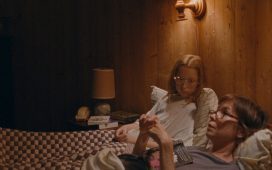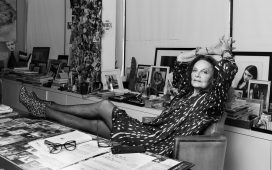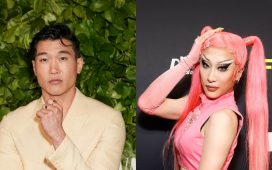It was really important to strike the balance of, yes, there’s tragedy in life and in this film, but the only things that can bring you back to who you were before trauma are joy and connection and community. I wanted to nail it because it’s important to me to also show what we lose in society and what we lose specifically in the arts when we don’t protect young women. We lose a lot of joy and comedy and their voices from their sense of humor and their POV.
What role does music play in the film?
Obviously, doing music videos helped me have a relationship with those artists, so I could ask and beg like, “Please, can we afford your song to put in our very small indie?” I also wanted the soundtrack to feel like it had been curated by these two young women. To me, it was about what songs do they listen to together? What is something that they would connect on even with that age gap? And maybe some of these artists would be in that category. And obviously, no one does sad pop better than Phoebe Bridgers, so we were very lucky to get those syncs.
Why was it important to you to have the soundtrack be all queer artists?
I don’t think they were all queer, but they’re all female or nonbinary artists. I don’t know. I just like the things that gay people and women make more than I like the things men make.
So true.
[laughs] Say that.
Not enough people having that conversation. On that note, I was wondering how your own queerness informs your approach to filmmaking?
I think we just like to look at things from slightly different angles and perspectives. Obviously, this film is not an inherently queer storyline, but I’m a queer filmmaker. It’s actually ironic that my first film isn’t about an overtly queer protagonist or anything like that. But I think that we are often looking at things from the outside as queer people, and we’re going, “Huh, my experience of that is different.”
That approach to life is similar to my approach to this film. I saw the way this type of storyline was handled a lot as an audience member and from the outside going like, “Huh, that’s not what it is like for me and the people I love and care about.” Recovery doesn’t hinge on revenge with an ax. I was like, “It looks different.”
Absolutely. I think that the rise of femme fatale revenge thrillers has been a very interesting development of the past decade or so.
It’s all centered around a very straight, white male, patriarchal idea that you heal and things are fixed when you win. When you get revenge or you get justice or you get retribution — these are all very heteronormative male ideas of what a hero’s arc and journey is. That’s not the point here. Healing and recovery don’t have fixed points on a timeline.








